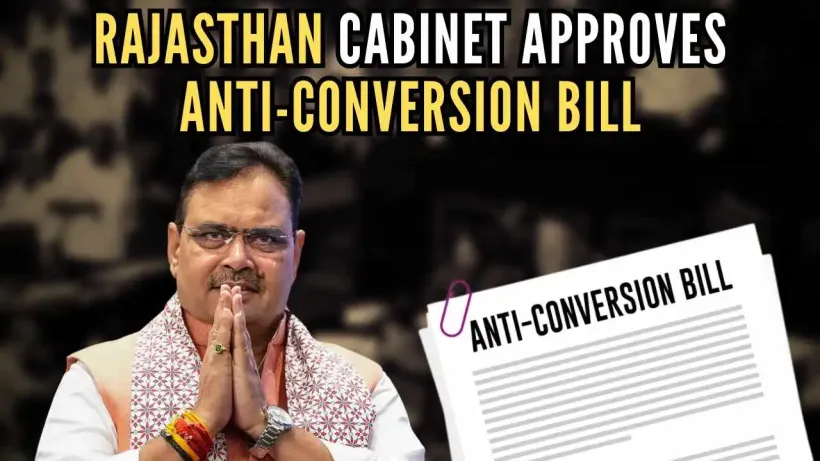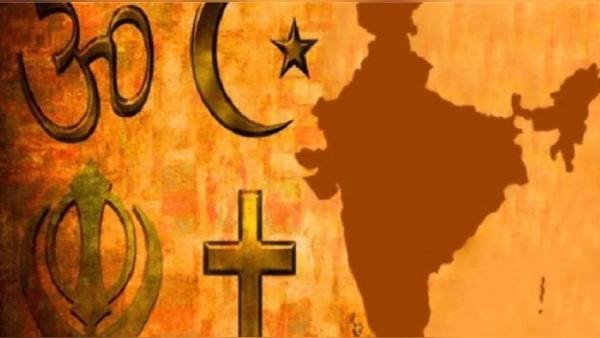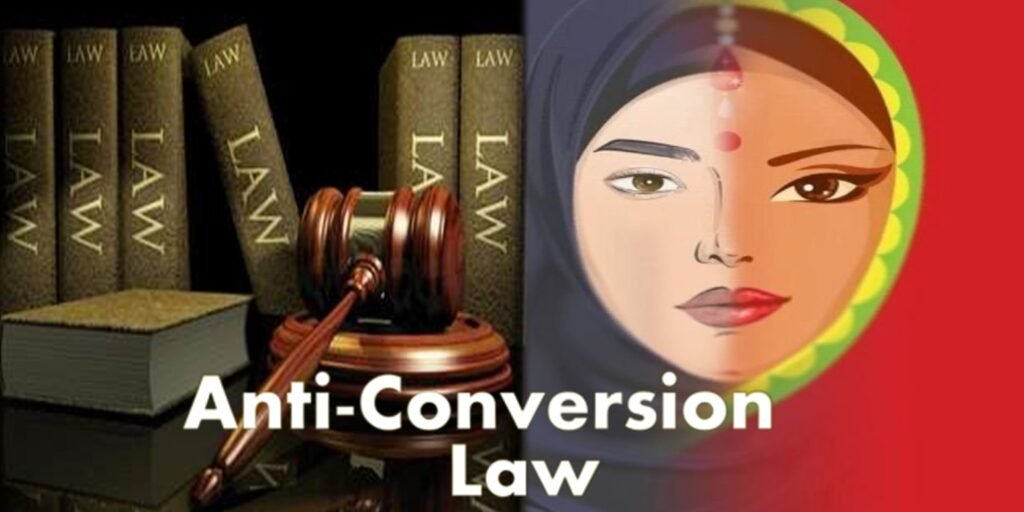Rajasthan Anti-Conversion Bill: The Rajasthan government has introduced the ‘Rajasthan Conversion (Prevention of Illegal Conversion) Bill’ in the assembly to curb illegal religious conversions. The bill aims to ensure that conversions are voluntary, without coercion, deception, or fraud. Under this law, those found guilty of forcibly converting someone’s religion or using deceit to influence conversions can face imprisonment of up to 10 years, along with a monetary fine.
This proposed legislation places Rajasthan among states actively addressing illegal conversions through stringent laws. Anti-conversion laws have already been implemented in several states, setting a precedent for this move. Once enacted, Rajasthan will join the list of states enforcing such regulations.
This bill raises critical questions:
What are the provisions of anti-conversion laws in other states?
How are they being implemented, and what impact have they had?
This report delves deeper into these issues, shedding light on the broader implications of such legislation.
Table of Contents

Strict provisions in the Bill
‘The Rajasthan Prohibition of Unlawful Conversion of Religion Bill-2024’ introduced by the Rajasthan government has a provision for strict action on incidents like conversion under pressure, converting someone’s religion by luring them and love jihad. According to the government, such incidents were increasing a lot in Rajasthan in the last few years, due to which it became necessary to bring this law.
What is the rule for changing religion voluntarily- According to the bill, if a person wants to change religion voluntarily, then he will have to inform the District Collector’s office 60 days before the change. If a person changes religion without permission, then legal action can be taken against him.
Love Jihad- According to this bill, if a person converts someone’s religion by luring or luring them, then he can be punished with 3 to 10 years of imprisonment. Apart from this, if a person is married only for the purpose of conversion, then that marriage can be annulled in the family court.
It seems there was an issue processing the Hindi text in the image. I will need to approach this differently to extract and translate the information. Let me try again.
| Key Provisions | Details |
|---|---|
| Punishment for Forced Conversion | 1 to 5 years of imprisonment and a fine of up to ₹15,000. |
| Punishment for Conversion of Specific Groups | For minors, women, or individuals from Scheduled Castes/Tribes: 2 to 10 years of imprisonment and a ₹25,000 fine. |
| Notice Period | Must notify the District Administration 60 days before the conversion. |
| Police Investigation | Police investigation required to verify conversion-related intentions. |
| Conversions for Sole Purpose of Marriage | If the sole purpose of marriage is conversion, it will be deemed invalid. |

Why does Rajasthan need this bill ?
Rajasthan Law Minister Jogaram Patel said about this bill that this bill was needed to stop illegal religious conversion in the state, because currently there is no law of any kind in Rajasthan to stop such cases. After approving this proposal in the cabinet meeting, it was presented in the assembly.
A similar bill was passed in 2008 as well
Let us tell you that in the year 2008, the Vasundhara Raje government had also presented a bill on religious conversion, although at that time it did not get the President’s approval.
What did the state government say while introducing the Rajasthan Conversion Bill
In the ‘Object and Reason’ statement of the bill, the state government has said, “The Constitution provides every person the fundamental right to believe, practice and propagate his religion. However, this right to freedom of individual religion cannot be considered as a collective right. This right applies equally to both the person converting and the person wishing to convert.”
It also said that in recent times, several instances have come to light where gullible people have been lured or deceived into converting to another religion through fraud, force, undue pressure, allurement or wrongful means.
“Inducement” can include “any kind of inducement”, including things like cash, material benefits, jobs, free education and a better lifestyle. Under this bill, the responsibility will be on the person who has converted to prove that it was not done through wrong or fraudulent means.

Anti-conversion laws in other states
After this move of Rajasthan, it is important to know whether such laws are already in force in other parts of the country and what is its status there. Many state governments have already made laws regarding conversion. Which gives the right to take action in such cases. Here we will know about some major states where anti-conversion laws are already in force.
Odisha
The first anti-conversion law was implemented in Odisha in 1967. Under this law, if a person forcibly converts someone, he can be sentenced to one year imprisonment and fined Rs 5000. After the implementation of this law in Odisha, many arrests were also made under it, although the information about the effect of this law has not been fully made public.
Madhya Pradesh
Anti-conversion law was implemented in Madhya Pradesh in 1968. This law provides for severe punishment for forced conversion. Under this, there can be a punishment of 10 years and a fine of up to Rs 20,000. This law is strictly followed in Madhya Pradesh, and controversies have also arisen on it from time to time. Recently, some Christians were arrested in Khandwa district on charges of forced conversion.
Gujarat
The ‘Gujarat Religious Freedom Act’ came into force in Gujarat in 2003, when Narendra Modi was the Chief Minister of the state. Under this law, there is a provision of punishment up to three years for forced religious conversion, and if marriage is done for conversion, then there can be a punishment of up to 10 years. This law of Gujarat is also implemented with strict rules, and many arrests have also been made under this law in the state.
Himachal Pradesh
Anti-conversion law was implemented in Himachal Pradesh in 2006. It was amended in 2019 during the tenure of Jairam Thakur, and this law provides for punishment up to 10 years. Apart from this, if marriage has been done for conversion, then that marriage will be declared invalid. This law is also effective in Himachal Pradesh and action has been taken in many cases under it.
Uttar Pradesh
The anti-conversion bill was passed in Uttar Pradesh in 2021, which was amended in 2024. This law of Uttar Pradesh is especially strict against those who convert women by deceiving them. Under this, if a person converts religion by force, luring or intimidating, then the culprit can be punished with imprisonment of 1 to 5 years and a fine of Rs 15,000.
Apart from this, according to the law of this state, there is a provision of 2 to 10 years of imprisonment and a fine of Rs 25,000 in the case of women, minors and SC-ST. At the same time, there can be a punishment of 3 to 10 years of imprisonment and a fine of at least 50 thousand rupees for mass conversion.
According to data from Uttar Pradesh, 427 cases were registered between January 1, 2021 and April 30, 2023, and 833 people were arrested. After the implementation of this law in Uttar Pradesh, many arrests have been made, in which people have been caught on charges of conversion.
Jharkhand and Uttarakhand
In Jharkhand, an anti-conversion law was implemented in 2017, while a similar law was passed in Uttarakhand in 2018. In both these states, there is a provision of punishment and fine for forced religious conversion. In Jharkhand, there can be a fine of up to Rs 50,000 and a sentence of 3 years, while in Uttarakhand there is a provision of punishment up to 10 years. Under this law in Uttarakhand, if the marriage is done only for the purpose of conversion, then that marriage is invalid.
Tamil Nadu
An anti-conversion law was introduced in Tamil Nadu in 2002, but it had to be repealed in 2006. The reason for this was opposition from the Christian community, who considered it a violation of religious freedom. There is no such law in this state at present, but controversies keep arising from time to time regarding conversion.
| State | Year | Key Provisions |
|---|---|---|
| Odisha | 1967 | Punishment for forced conversion: 1 year imprisonment and ₹5,000 fine. |
| Madhya Pradesh | 1968 | Law against conversion introduced, includes punishment for forced conversions. |
| Arunachal Pradesh | 1978 | Law implemented to specifically prevent forced religious conversions. |
| Chhattisgarh | 2000 (amended 2006) | Punishment for forced conversion: Up to 10 years imprisonment and ₹20,000 fine. |
| Gujarat | 2003 | Punishment for forced conversion: 3 years imprisonment; 10 years imprisonment if conversion involves marriage. |
| Himachal Pradesh | 2006 (amended 2019) | Punishment for forced conversion: Up to 10 years imprisonment; marriages for conversion declared invalid. |
| Jharkhand | 2017 | Punishment: Up to 3 years imprisonment or ₹50,000 fine. Crimes involving minors, women, or SC/ST: 4 years imprisonment. |
| Uttarakhand | 2018 | Punishment: Up to 10 years imprisonment; marriages for the purpose of conversion declared invalid. |
| Tamil Nadu | 2002 | Anti-conversion law introduced but repealed in 2006 due to opposition from Christian communities. |
| Uttar Pradesh | 2021 (amended 2024) | Anti-conversion law passed in 2021 and made stricter with amendments in 2024. |
Effects and Controversies of these laws
The purpose of these anti-conversion laws is that conversion should be done voluntarily and without any pressure, fraud or inducement. However, there have been controversies in some states after the implementation of these laws. Critics say that religious freedom is being curbed through these laws, and it violates individual rights.
It has often been alleged that these laws can be misused, especially against minorities. Apart from this, some state governments have not even made public the information about action taken under this law, which raises the question of what is the actual effect of these laws.
| What does Article 25 of the Constitution state? |
|---|
| Key Points |
| – Every person has the right to follow, practice, and propagate their religion and beliefs. |
| – While practicing religious freedom, public order, health, and morality must not be violated. |
| – The state can intervene in religious activities if it is necessary for the welfare of society. |
| – Every individual has the right to spread their religion at public places. |
| – The state can regulate the management and property of religious institutions, provided it does not infringe on religious freedom. |

History of Anti-Conversion Laws
Article 25 of the Constitution of India gives every citizen the freedom to practice, profess and propagate his religion, but this freedom is placed under certain conditions. Such as what is necessary for public order, morality and health. This means that all the people of the country are free to follow their religion, but it should not be done in a way that harms the rights of others or the order of society.
After independence, the Indian Parliament made several attempts to stop religious conversions, but none of these bills could be passed.
1. 1954 – The Indian Conversion of Religion (Regulation and Registration) Bill was introduced this year, aimed at controlling religious conversions, but it did not get enough support in Parliament and could not be passed.
2. 1960 – The “Backward Communities (Religious Protection) Bill” was introduced, aimed at preventing Hindus from converting to certain religions, such as Islam, Christianity, Judaism and Zoroastrianism. But this too could not be passed.
3. 1979 – This year the Freedom of Religion Bill was introduced, which tried to ban inter-religious conversion. This bill too could not be passed in the Parliament.
It is clear from these efforts that the legislative steps taken regarding conversion could not garner sufficient support in the Parliament, and no concrete law could be made on this issue.
Population Growth by Religion in India: Key Highlights
- Total Population (2011 Census)
- Total: 121+ crore
- Hindus: 96.63 crore (79.8%)
- Muslims: 17.22 crore (14.2%)
- Christians: 2.78 crore (2.3%)
- Sikhs: 2.08 crore (1.7%)
- Others: Buddhists and Jains together form less than 1%.
- Population Growth (2001-2011)
- Overall population growth: 17.7%
- Muslims: Highest growth at 25%
- Hindus: Grew by less than 17%
- Christians: Growth of 15.5%
- Sikhs: Growth of 8.4%
- Buddhists: Growth of 6.1%
- Jains: Growth of 5.4%
- Population Growth (1951-2011)
- Muslims: Increased by 386% (from 3.54 crore in 1951 to 17.22 crore in 2011).
- Hindus: Increased by 218% (from 30.35 crore in 1951 to 96.63 crore in 2011).
- Sikhs: Increased by 235%.
- Christians: Increased by 232%.
This analysis showcases the varying rates of population growth among different religious communities over the years in India.
Also Read:

